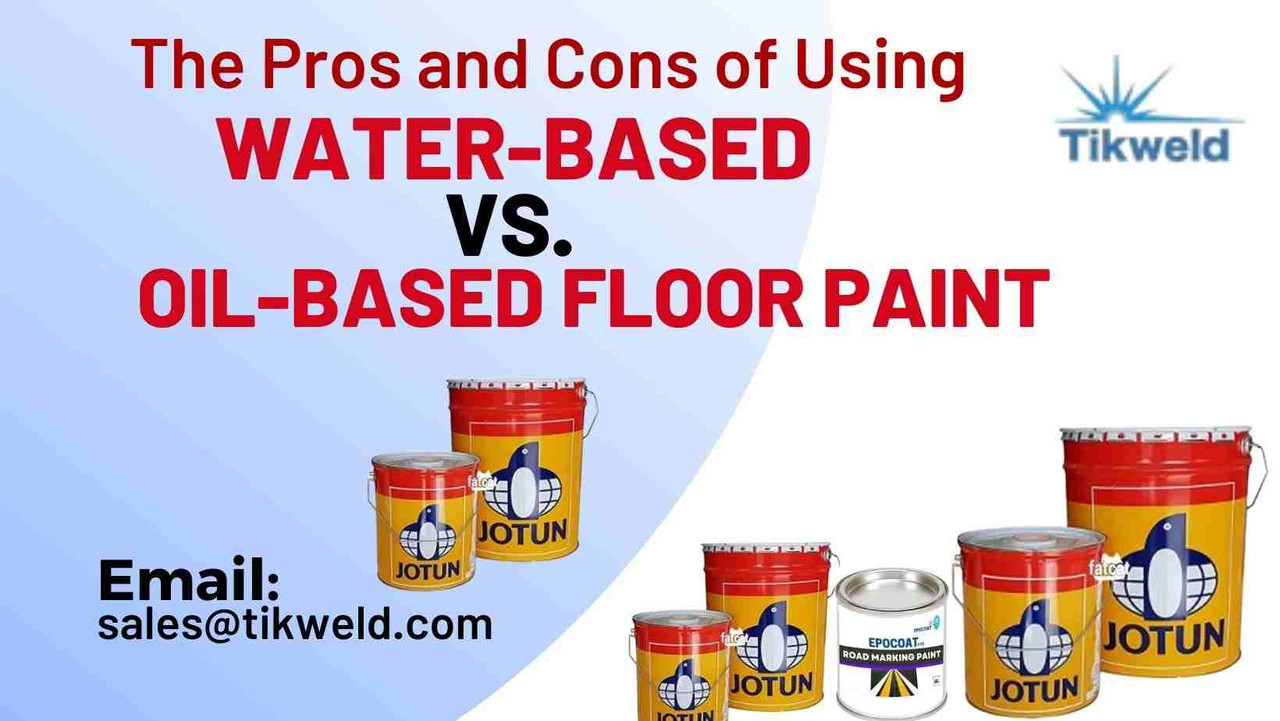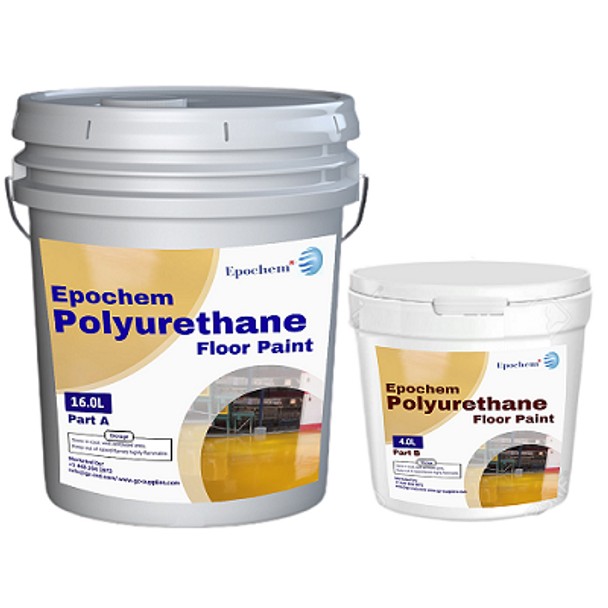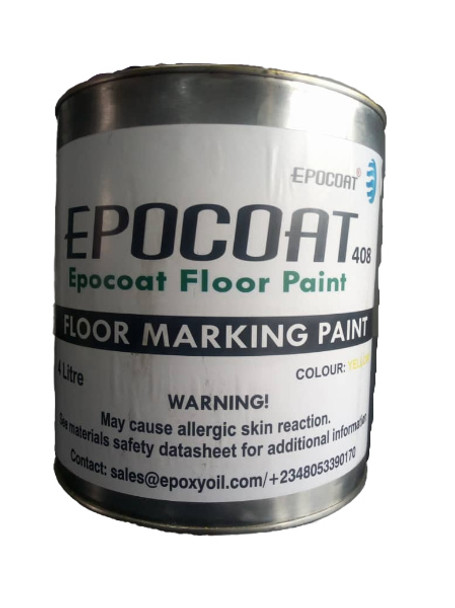The Pros and Cons of Using Water-Based vs. Oil-Based Floor Paint
Introduction
When it comes to refreshing either your home's flooring, or facility flooring, choosing the right floor paint can make all the difference. As you embark on your floor painting project, you will likely encounter two main options: water-based and oil-based paints. Each type offers distinct advantages and drawbacks that can significantly impact the outcome of your renovation.
Understanding the pros and cons of these paint varieties is crucial for making an informed decision that aligns with your specific needs and preferences. We will explore the key differences between water-based and oil-based floor paints, helping you navigate the selection process with confidence and ensure a successful transformation of your living space.
Key Takeaway
- Drying Time Matters: Water-based floor paints dry significantly faster (within hours), making them ideal for projects requiring quick turnaround, while oil-based paints may take up to 24 hours or more to cure fully.
- Durability and Resistance: Oil-based paints generally offer higher abrasion resistance and durability, especially in high-traffic or industrial areas. However, modern water-based formulas have improved significantly and now provide good durability with easier maintenance.
- Environmental and Health Impact: Water-based paints are low in VOCs (volatile organic compounds), making them safer for indoor use and more eco-friendly. Oil-based paints, though more resilient, emit stronger fumes and require more ventilation during application.
Floor Paint Types: Water-Based vs. Oil-Based
When selecting floor paint for your project, you'll primarily encounter two main types: water-based and oil-based. Understanding the characteristics of each can help you make an informed decision that best suits your needs.
Water-Based Floor Paint
Water-based floor paints have gained popularity in recent years due to their numerous advantages. These paints are known for their quick drying time, allowing you to complete your project faster. They also emit fewer volatile organic compounds (VOCs), making them a more environmentally friendly and safer option for indoor use.
One of the standout features of water-based paints is their ease of cleanup. You can simply use soap and water to clean your brushes and rollers, saving time and avoiding harsh solvents. Additionally, these paints tend to maintain their color better over time, resisting yellowing and fading.
Oil-Based Floor Paint
Oil-based floor paints have been the traditional choice for many years, and they still offer certain benefits. These paints are renowned for their durability and ability to withstand heavy foot traffic. They create a hard, glossy finish that can be particularly attractive on wood floors.
You will find that oil-based paints have excellent adhesion properties, making them ideal for surfaces that may be slightly chalky or have minor imperfections. They also tend to level out more smoothly, which can help hide small irregularities in the floor.
Considerations for Choice
When deciding between water-based and oil-based floor paints, consider factors such as:
- Drying time
- Durability requirements
- Environmental concerns
- Ease of application and cleanup
- The specific surface you're painting
By weighing these factors against the characteristics of each paint type, you will be better equipped to choose the right floor paint for your project.
Pros of Water-Based Floor Paints
When considering floor paint options for your home or business, water-based formulations offer several compelling advantages. Let's explore the benefits that make these paints an increasingly popular choice among property owners and contractors alike.
Quick Drying Time
One of the most significant advantages of water-based floor paints is their rapid drying time. You will discover that these paints typically dry to the touch within 1-2 hours, allowing for faster project completion. This quick-drying characteristic enables you to apply multiple coats in a single day, minimizing disruption to your space's functionality.
Low Odor and VOC Emissions
Water-based floor paints are known for their low odor and minimal volatile organic compound (VOC) emissions. This feature makes them an excellent choice for indoor applications, especially in areas with limited ventilation. You'll appreciate the reduced risk of headaches, respiratory irritation, and other health concerns associated with strong paint fumes.
Comparison Table: Water-Based vs. Oil-Based Floor Paints

Easy Clean-Up and Maintenance
Another benefit of water-based floor paints is their ease of clean-up and maintenance. You can simply use soap and water to clean your brushes, rollers, and other painting tools, eliminating the need for harsh solvents. Additionally, these paints are less likely to yellow or fade over time, helping maintain your floor's appearance for years to come.
Environmental Friendliness
Choosing water-based floor paints aligns with eco-conscious practices. These paints are typically made with fewer harmful chemicals and have a lower environmental impact compared to their oil-based counterparts. By opting for water-based formulations, you're contributing to reduced air pollution and supporting sustainable building practices.
Excellent Adhesion and Durability
Contrary to common misconceptions, modern water-based floor paints offer excellent adhesion and durability. You will find that these paints adhere well to properly prepared surfaces and can withstand heavy foot traffic, making them suitable for both residential and commercial applications. Many water-based formulations also provide resistance to chemicals, stains, and UV radiation, ensuring long-lasting protection for your floors.
 Epochem Polyurethane Floor Paint
Epochem Polyurethane Floor Paint
Cons of Water-Based Floor Paints
While water-based floor paints offer numerous advantages, they also come with several drawbacks that you should consider before making your choice. Understanding these limitations will help you make an informed decision about whether water-based paint is the right option for your flooring project.
Durability Concerns
Water-based floor paints generally have lower durability compared to their oil-based counterparts. You may find that these paints are more susceptible to wear and tear, especially in high-traffic areas. Over time, you might notice:
- Increased scratching and scuffing
- Faster color fading, particularly in areas exposed to sunlight
- More frequent need for touch-ups or repainting
This reduced longevity can be a significant drawback if you're looking for a long-term flooring solution.
Limited Chemical Resistance
Another limitation of water-based floor paints is their reduced resistance to chemicals. If you're planning to use the painted surface in an area exposed to various substances, such as a garage or workshop, you should be aware that:
- Oil and grease stains may be more difficult to clean
- Harsh cleaning agents could potentially damage the paint finish
- Chemical spills might lead to paint degradation more quickly than with oil-based alternatives
Application Challenges
While water-based paints are generally easier to apply, they do present some unique challenges during the application process. You may encounter:
- Faster drying times, which can make it difficult to maintain a wet edge and achieve a smooth finish
- Increased sensitivity to temperature and humidity during application
- Potential for bubbling or foaming, especially if the paint is over-agitated
Additionally, water-based paints typically require more coats to achieve full coverage and opacity, which can increase your overall project time and cost.
 Airless Sprayer MARK V Type HVBAN EP450ITX
Airless Sprayer MARK V Type HVBAN EP450ITX
Pros of Oil-Based Floor Paints
Oil-based floor paints have long been a popular choice for many homeowners and professionals due to their unique properties and advantages. When considering your flooring options, it's important to understand the benefits that oil-based paints can offer.
Durability and Longevity
One of the most significant advantages of oil-based floor paints is their exceptional durability. These paints create a hard, resilient surface that can withstand heavy foot traffic, impacts, and wear and tear. You will discover that oil-based paints are particularly well-suited for high-traffic areas in your home or commercial spaces. Their robust nature means you won't need to repaint as frequently, saving you time and money in the long run.
Superior Coverage and Finish
When you apply oil-based floor paint, you'll notice its superior coverage capabilities. These paints typically require fewer coats to achieve a smooth, even finish compared to their water-based counterparts. The result is a rich, glossy appearance that enhances the look of your floors. Oil-based paints also have excellent self-leveling properties, which means they tend to settle into a flat, uniform surface as they dry, minimizing brush marks and imperfections.
Moisture Resistance
If you're painting floors in areas prone to moisture, such as basements or garages, oil-based paints offer a significant advantage. These paints create a water-resistant barrier that helps protect the underlying surface from moisture damage. This property makes them an excellent choice for areas that may be exposed to spills, humidity, or occasional water contact.
Versatility and Adhesion
Oil-based floor paints exhibit excellent adhesion properties, allowing them to bond well with a variety of surfaces. Whether you're painting over wood, concrete, or previously painted floors, you will notice that oil-based paints adhere strongly and provide a lasting finish. This versatility makes them a go-to option for many different flooring projects, from residential to industrial applications.
 Floor Marking Paint EPOCOAT 408
Floor Marking Paint EPOCOAT 408
Cons of Oil-Based Floor Paints
Strong Odor and Slow Drying Time
When you choose oil-based floor paints, you'll need to contend with a powerful, lingering odor. This pungent smell can persist for days or even weeks after application, making it challenging to occupy the space comfortably. Additionally, oil-based paints take significantly longer to dry compared to their water-based counterparts. You may need to wait up to 24 hours between coats and several days before the floor is fully cured and ready for foot traffic.
Environmental and Health Concerns
Oil-based floor paints contain higher levels of volatile organic compounds (VOCs) than water-based alternatives. These VOCs can be harmful to both the environment and your health. When using oil-based paints, you will need to ensure proper ventilation to minimize exposure to these potentially toxic fumes. Moreover, the disposal of oil-based paints and their associated solvents requires special handling to comply with environmental regulations.
Maintenance and Yellowing Issues
Over time, you may notice that oil-based floor paints tend to yellow, especially in areas with limited natural light. This discoloration can detract from the overall appearance of your floor. Furthermore, maintaining oil-based painted floors can be more challenging. These surfaces are prone to cracking and peeling, particularly in high-traffic areas or when exposed to temperature fluctuations. When it comes time to repaint, you'll need to sand the surface thoroughly to ensure proper adhesion of the new coat.
Cleanup Difficulties and Cost Considerations
Cleaning up after using oil-based floor paints can be a cumbersome process. You'll need to use harsh solvents like mineral spirits or paint thinners to remove paint from brushes, rollers, and other tools. This not only adds to the overall cost of your project but also increases your exposure to potentially harmful chemicals. Speaking of cost, oil-based paints are generally more expensive than water-based options, which can impact your budget, especially for larger floor areas.
Frequently Asked Questions
1. Which type of floor paint is more durable for heavy foot traffic?
Oil-based floor paint generally provides superior durability and resistance to abrasion, making it more suitable for garages, warehouses, and high-traffic areas. However, newer water-based options also offer good resilience with proper surface prep.
2. Is water-based floor paint better for indoor use?
Yes, water-based paints emit fewer VOCs, have minimal odor, and are safer to use indoors, especially in poorly ventilated spaces. They are also environmentally friendly and easier to clean up.
3. Can I apply water-based paint over existing oil-based paint?
It’s possible, but you must properly clean, sand, and prime the surface before applying water-based paint over oil-based coatings to ensure proper adhesion.
4. What is the drying time difference between the two?
Water-based floor paints typically dry to the touch in 1–2 hours and can be recoated the same day. Oil-based paints may take 6–24 hours to dry and require longer curing time before use.
5. Which type of floor paint is easier to apply and clean up?
Water-based floor paints are easier to apply and clean using just soap and water. Oil-based paints need solvents like mineral spirits or turpentine for cleanup, which can be more time-consuming and require proper ventilation.
Conclusion
As you weigh your options for floor paint, consider your specific needs and priorities. Water-based paints offer easier application, faster drying times, and lower VOCs, making them ideal for quick projects and environmentally-conscious homeowners. On the other hand, oil-based paints provide superior durability and a smoother finish, perfect for high-traffic areas or when longevity is paramount.
Ultimately, the choice between water-based and oil-based floor paint depends on your unique circumstances. By carefully evaluating the pros and cons of each type, you can make an informed decision that will result in a beautiful, long-lasting floor finish tailored to your requirements.
Contact Us to discuss your floor paint needs, lets guide you in choosing the perfect floor paint for your project.












